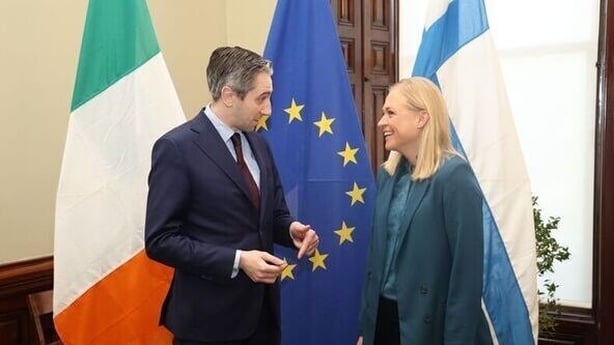Sinn Féin's Spokesperson on Foreign Affairs has said changes to the 'triple lock' will cause "significant risk" to Irish neutrality.
The triple lock guarantees that no more than 12 Irish soldiers can be sent into battle zones without the permission of the Government, the Dáil, and the United Nations.
Draft legislation which would remove the requirement for UN Security Council authorisation will be brought to Cabinet tomorrow by Tánaiste and Minister for Foreign Affairs and Defence Simon Harris.
Speaking on RTÉ's Morning Ireland, Donnchadh Ó Laoghaire said neutrality is valued by Irish people and the State's neutrality reflects a clear understanding of Ireland's place in the world.
"Fundamentally what this will mean is ... the government of the day will be in a position to deploy Irish troops to any mission that they wish, to any location that they wish, provided they have a majority. We believe that that causes significant risk to our neutrality."
We need your consent to load this rte-player contentWe use rte-player to manage extra content that can set cookies on your device and collect data about your activity. Please review their details and accept them to load the content.Manage Preferences
"We are not a major military power. The best way in which we can exercise influence in the world is as a neutral state that commands respect across the world," said Mr Ó Laoghaire.
The TD for Cork South-Central added that "a lot of store" was put in the triple lock neutrality by previous governments who told the electorate that they had "nothing to fear from Nice or Lisbon [treaties]" because of the existence of the triple lock.
The triple lock is a strong and logical safeguard, Mr Ó Laoghaire added.
Speaking yesterday, the Tánaiste said that no peacekeeping mission had been authorised by the Security Council since 2014, and such a veto "needs to be modified" and that could include regional cooperation with EU member states.
Asked if Irish troops could in the future participate in a peacekeeping mission in Ukraine, Mr Harris said that he did not think that Ireland could "recuse" itself from participating.
He added that, under the current rules, the Government would effectively have to seek Russian permission, which he described as "a rather bizarre situation".
Under existing rules, 12 members of the Irish Defence Forces can be sent on an overseas mission without triggering the triple lock.
The Tánaiste said that this would be increased from 12 to 50 members, saying that Ireland has to be "agile" and be in a position to get Irish citizens out of danger as was the case recently in Afghanistan and Sudan.
Mr Ó Laoghaire said Sinn Féin would keep an open mind about Irish troops potentially joining UN peacekeeping troops in Ukraine, if such a situation arose.
Harris meets Finnish Foreign Minister in Dublin
Meanwhile, Simon Harris said Ireland stands in full solidarity with Ukraine at this critical moment for European security.
Mr Harris was speaking after a meeting with Finnish Foreign Minister Elina Valtonen this afternoon in Iveagh House.

"Together with our EU partners, we will continue to support Ukraine in the face of Russia's continuing aggression and work to achieve a comprehensive, just and lasting peace," Mr Harris said.
The ministers discussed bilateral relations, support for Ukraine, European security and competitiveness.
"Finland is a close partner and Nordic neighbour with a similar population size and advanced economy. There are resonances of historical experiences and a kindred spirit that have shaped the outlook of both our countries as advocates for a rules-based international order that protects our interests.
"We have a long history of cooperation in peacekeeping and peace building including Finland’s own contribution to peace on this island. In recent years, we have deepened our relationship through our Global Ireland Nordic Baltic Strategy.
"We can also learn from each other and face any difficulties together. No state acting alone can address the entirety of existing and emerging challenges so a meeting like today’s enhances understanding and makes us stronger," Mr Harris said.
The visit of Ms Valtonen was the first visit by a Finnish foreign minister to Ireland since 2017.
Following her visit to Dublin, she will travel to Belfast to deliver the annual Harri Holkeri lecture at Queen’s University.
The title of her lecture is 'Peace mediation in the age of geopolitical contestation'.

